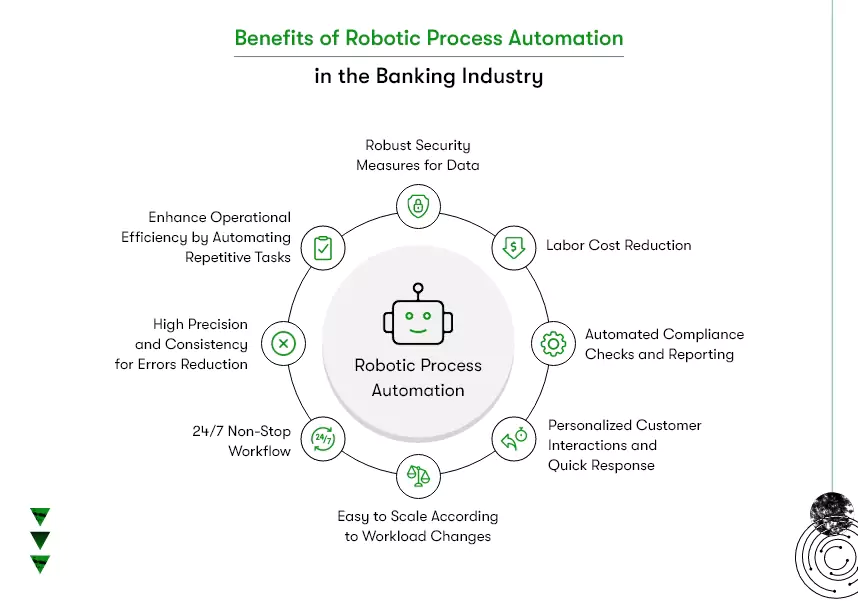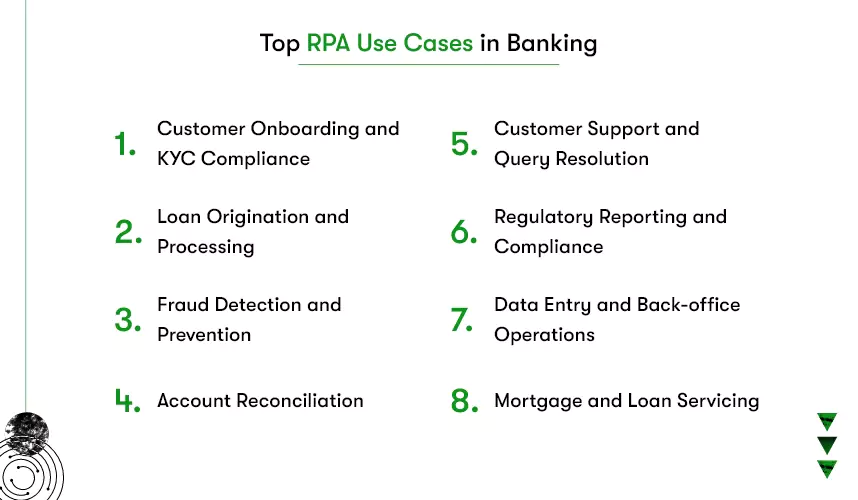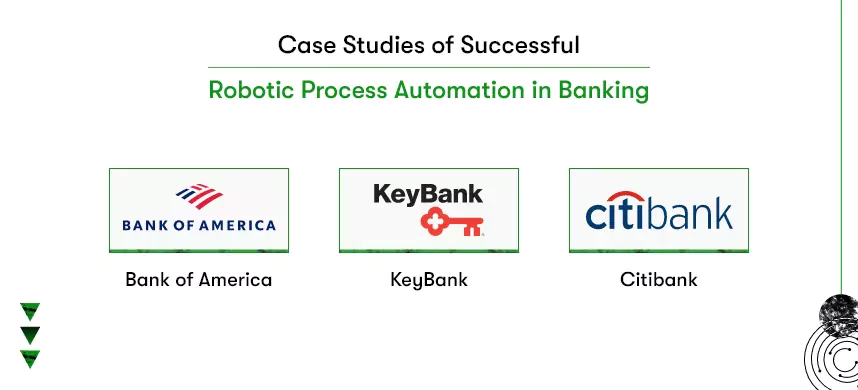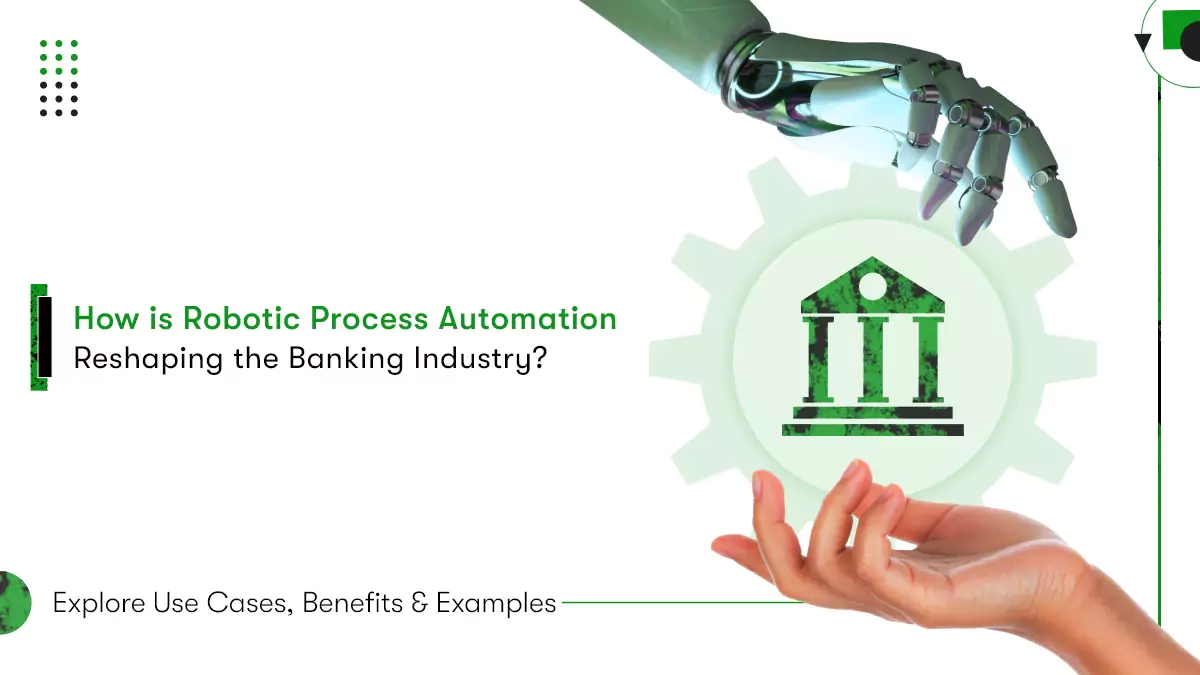Stiff competition from emerging Fintechs, ensuring compliance with evolving regulations while meeting customer expectations, all at once is overwhelming the banks in the USA. Besides, failure to balance these demands can hinder a bank’s growth and jeopardize its very existence.
But how can a bank bogged down under routine tasks turn the tables and come out on top of the competition? The answer is simple: Robotic Process Automation (RPA).
About 80% of finance leaders have adopted or plan to adopt the RPA into their operations.
Robotic Process Automation in banking is a technology that can automate a bank’s mundane and repetitive tasks with the help of software bots. Implementing this technology allows banks and finance institutes to enhance efficiency and boost productivity across departments.
If you’re planning for Digital Banking Transformation, here’s the guide you need!
What is RPA, and how can you use it for your benefit? Let us help you figure it out. We’ll also dive into the challenges banks face while adopting RPA and how to overcome them. So, buckle up. Here we go!
What is RPA in banking?
Robotic Process Automation (RPA) is a transformative technology that is reshaping the way banks operate, offering a streamlined and efficient approach to handling repetitive and rule-based tasks. Simply put, RPA refers to the use of software robots or bots to automate routine processes, allowing businesses to achieve higher productivity, accuracy, and cost savings.
These bots are developed through a blend of machine learning and artificial intelligence, a process that involves AI and ML development alongside software programming. Software Bots in RPA are designed to mimic human actions, interacting with various digital systems, applications, and data sources.
In the banking sector, RPA takes automation to the next level. Banks deal with a multitude of repetitive tasks, from data entry and transaction processing to compliance checks and customer support inquiries.
Robotic Process Automation in banking app development leverages sophisticated algorithms and software robots to handle these tasks efficiently. In return, human employees can focus on more complex and strategic responsibilities.
Let’s explore what benefits banks that implement RPA can reap.
Benefits of Robotic Process Automation in the Banking Industry

Considering the implementation of Robotic Process Automation (RPA) in your bank is a strategic move that can yield a plethora of benefits across various aspects of your operations.
Enhance Operational Efficiency by Automating Repetitive Tasks
RPA eliminates the need for manual handling of routine processes such as data entry, document verification, and transaction processing. This automation accelerates task completion, reduces processing times, and minimizes the risk of delays, leading to enhanced operational efficiency.
High Precision and Consistency for Errors Reduction
RPA bots perform tasks with an astonishing degree of accuracy and consistency. By minimizing human errors in data input and processing, RPA ensures that your bank maintains data integrity and reduces the risk of costly mistakes that can damage your reputation and financial stability.
24/7 Non-Stop Workflow
Software bots in RPA solutions operate round the clock, providing uninterrupted service. This means critical functions like transaction monitoring and customer support can continue seamlessly during weekends, holidays, or outside regular business hours, meeting customers’ needs without interruption.
Easy to Scale According to Workload Changes
RPA solutions are easily scalable. Whether your bank experiences surges in workload during peak periods or needs to streamline operations during quieter times, RPA can adapt to the changing demands of your business. This flexibility ensures efficient resource allocation.
Personalized Customer Interactions and Quick Response
Through Natural Language Processing (NLP) and AI-driven bots, RPA enables personalized customer interactions. Chatbots can provide tailored recommendations, answer inquiries promptly, and resolve customer issues efficiently. This level of engagement enhances customer satisfaction and fosters loyalty.
Automated Compliance Checks and Reporting
You can also program RPA systems to perform continuous compliance checks, ensuring that your bank adheres to ever-evolving financial regulations. Additionally, these systems can generate comprehensive reports, streamlining the compliance process and reducing the risk of regulatory penalties.
Labor Cost Reduction
By automating labor-intensive tasks, RPA significantly reduces operational costs associated with manual labor. This cost-saving allows your bank to allocate resources more strategically, enabling investments in innovation, customer experience enhancements, and growth initiatives.
Robust Security Measures for Data
RPA systems are designed with stringent security protocols to safeguard sensitive customer data. This level of data protection minimizes the risk of data breaches, instills customer trust, and ensures compliance with data protection regulations.
Explore AI in Banking use cases, trends, examples, and more.
How is RPA used in Banking? RPA use cases in banking
According to a Deloitte study, A typical bank with 125,000 customers that on-boards 3% of new customers and expands services for another 6% – 7% of its customers each year could see a one-time savings of 100 million during onboarding and could see another $100 million in savings every three years from automation of ongoing monitoring processes.
That said, leveraging the benefits of Robotic Process Automation (RPA) in your bank can be a transformative endeavor. RPA can be applied across various areas and processes within your bank to streamline operations, enhance efficiency, and improve customer service. Here are some key areas where you can use RPA and how to implement it effectively:

Customer Onboarding and KYC Compliance
A bank spends about 52 million USD on KYC compliance, customer due diligence, and onboarding per year, a study says. Robotic Process Automation can reduce this cost by automating onboarding and KYC processes, minimizing the compliance staff requirement. For example,
- Implement RPA bots to collect, validate, and process customer information during onboarding.
- Automate Know Your Customer (KYC) checks by cross-referencing customer data with regulatory databases.
- Employ RPA for identity verification and document validation.
Loan Origination and Processing
It takes about 35 to 40 days for a bank or finance institution to close a loan with traditional methods. Carrying out collecting, formatting, and verifying the documents, background verification, and manually performing KYC checks require significant time. Since it involves human intervention, there are high chances of error.
The implementation of the Robotic Process Automation solution, on the other hand, can automate the entire loan processing from data collation to loan disbursement. For instance,
- Automate data extraction from loan applications.
- Use RPA bots to assess creditworthiness by analyzing financial data.
- Streamline loan approval processes and documentation verification.
- Automate loan disbursement and repayment tracking.
Fraud Detection and Prevention
In a survey, 91% of financial professionals confirmed the increase in fraud at their organizations year-over-year. By implementing an RPA-enabled fraud detection system, you can automate transaction monitoring to identify patterns, trends, or anomalies, preventing fraud.
- Implement RPA bots to analyze transaction patterns for unusual activities.
- Automatically flag and investigate suspicious transactions.
- Enhance fraud prevention measures by using RPA to detect anomalies in real time.
Account Reconciliation
AI-powered Robotic Process Automation can extract relevant documents and data from your bank’s data files and perform quick analysis to identify discrepancies. Consequently, banks can streamline the reconciliation process, improving efficiency and reducing time and errors. It can also,
- Automate the reconciliation of accounts by matching transactions.
- Detect and resolve discrepancies in financial data.
- Generate accurate and timely reconciliation reports.
Customer Support and Query Resolution
Banks receive a high volume of inquiries daily through various channels. With the lack of resources, it becomes challenging for banks to respond to their customers on time. Consequently, not being able to meet your customer queries on time can negatively impact your bank’s reputation.
On the contrary, RPA can help your bank resolve customer support challenges as the bots can work round the clock. Besides automating routine queries and responses, RPA can ensure accuracy and consistency, maintaining historical context to solve complex queries.
Here’s how you can use RPA to automate your bank’s customer support system.
- Integrate chatbots with NLP capabilities to provide instant responses to customer inquiries.
- Automate handling of routine customer requests, such as balance inquiries or account updates.
- Escalate complex issues to human agents when necessary.
Regulatory Reporting and Compliance
Federal Reserve Board of Governors’ says banks still have “work to do” to meet supervision and regulation expectations. AML, Data Security, Consumer Protection, and so on, regulations are emerging parallel to technological innovations and developments in the banking industry. This can be a significant challenge for banks to comply with all the regulations.
Using RPA, however, banks can automate compliance and regulatory reporting. As a result, it reduces the time and effort required for manual compliance reporting.
- Automate data collection from multiple sources to ensure regulatory compliance.
- Automate the processing and validation of data to ensure accuracy and consistency.
- Ensure that reports are generated on time and in compliance with regulatory requirements.
- Integrate with the existing banking systems to automate the management of regulatory requirements.

Mortgage and Loan Servicing
Manually processing mortgage and loan applications can be a time-consuming process for your bank. Moreover, manual processing can lead to errors, causing delays and sometimes penalties and fines.
You can also use Robotic Process Automation to streamline your mortgage and loan services. It can help you,
- Automate the processing of mortgage and loan payments.
- Manage loan documentation and payment schedules efficiently.
- Enhance communication with borrowers through automated reminders and notifications.
Data Entry and Back-office operations
Manual data entry is prone to errors, potentially leading to inaccuracies in critical financial data. Whereas manually validating data can be resource-intensive for your bank and may result in delays and inefficiencies. You can automate various tasks by replacing human resources with RPA bots, eliminating human intervention and errors. For example,
- RPA bots can carry out Data entry tasks with accuracy and speed.
- Automate data validation and error-checking processes.
- Optimize back-office tasks such as data migration and record keeping.
- Reduce manual intervention in administrative processes.
Another AI-driven solution, Virtual Assistant in banking, is also gaining traction. Know which top banks are at the forefront of VBA adoption and more.
Robotic Process Automation in banking can be used to automate a myriad of processes, ensuring accuracy and reducing time. Now, let us see banks that have actually gained all the benefits by implementing RPA in the banking industry.
Case Studies of Successful Robotic Process Automation in Banking
Robotic Process Automation solutions usually cost ⅓ of the amount spent on an offshore employee and ⅕ of an in-house employee.
Source – Gartner report.
According to the same report, 64% of CFOs from BFSI companies believe autonomous finance will become a reality within the next six years. And, it has started happening already. Proof can be seen in the following examples.

Bank of America
The second-largest bank in the USA, Bank of America, has invested about $25 billion in new technology initiatives since 2010. Besides internal cloud and software architecture for enhancing efficiency and time to market, they integrate RPA across systems for agility, accuracy, and flexibility.
Challenge: The bank serves millions of customers every day. They needed a hyper-automation solution to modernize and automate their operations throughout the front, middle, and back offices.
The Bank of America wanted to enhance customer experience and efficiency without sacrificing quality and security. And tedious manual tasks were a major roadblock. However, AI-powered robotic process automation emerged as the best solution to overcome these challenges.
Results: RPA solutions adopted by the Bank of America resulted in hundreds of thousands of hours saved. Additionally, the bank witnessed improved customer satisfaction and reduced errors as their banking process automation is now more efficient and consistent. Also, they achieved a 40% reduction in manual workarounds.
KeyBank
One of the largest banks in the United States, KeyBank’s customer base spans retail, small business, corporate, commercial, and investment clients.
Challenge: KeyBank identified the need to improve the efficiency of its loan approval process. To address this, they adopted Robotic Process Automation (RPA).
Solution: KeyBank implemented intelligent automation solutions to streamline the loan approval workflow, automating tasks involved in the loan approval process, including data analysis and validation.
Results:
- Faster Loan Approvals: RPA reduced the time required for loan approvals by automating time-consuming tasks.
- Increased Accuracy: Automation improved the accuracy of data analysis and validation, reducing errors.
- Enhanced Customer Experience: Faster and more accurate loan approvals improved customer satisfaction.
Citibank
Citibank is a global bank headquartered in New York City, founded in 1812 as the City Bank of New York. It has a long history of innovation and growth.
Challenge: In the wake of fraud risks, Citibank recognized the need to improve its security. To address this challenge, the bank decided to adopt a combination of next-generation technologies, including AI and Robotic Process Automation (RPA).
Solution: Citibank harnessed the power of AI and RPA to bolster security and combat fraud. They implemented the solution to monitor customer payment behavior and locations for unusual patterns and detect any suspicious activity.
Results:
- Citibank’s use of AI and RPA significantly strengthened security measures, making it more difficult for fraudulent actions to occur.
- The AI technology assisted in Anti-Money Laundering efforts by flagging suspicious transactions.
How Kody Technolab contributes to RPA implementation in the banking sector
The Global Robotic Process Automation market size is $2.3B, and the BFSI sector holds the largest revenue share, accounting for 28.8%.
Source – Grand View Research.
Lack of skilled resources, high personnel costs, and the need to increase productivity are the key factors driving the adoption of RPA in the banking sector.
To overcome these challenges, Kody Technolab helps banks with tailored RPA solutions and offers experienced Fintech developers for hire. Our team of experts can assist your bank in leveraging automation to overcome resource constraints and cost pressures.
Our experience in the banking industry makes it easy for us to ensure compliance and build competitive solutions using cutting-edge technology.












 Contact Information
Contact Information